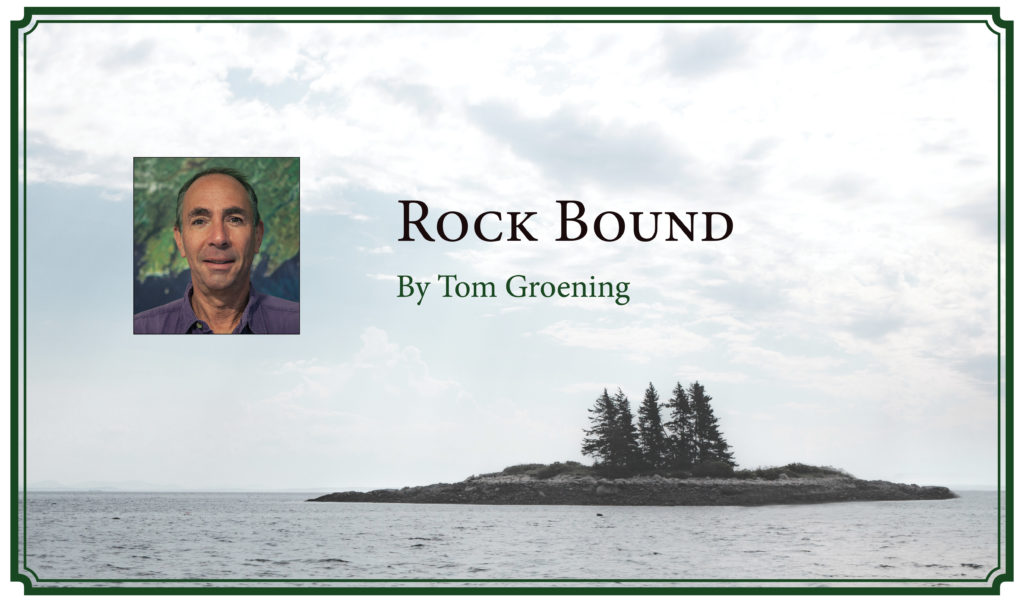By Tom Groening
Now that I have six years under my belt here at the Island Institute, I’ve begun—cautiously—to accept a few speaking engagements, holding forth on the topic of the working waterfront. My presentation is very much a work in progress, and I begin by disclosing that I am not, by any means, an expert on the subject.
Early in my Power Point presentation, I show a photo of a plant in Rockland’s industrial park, specifically, a loading dock where two, 18-wheeler-type trailers are backed in, ready to be loaded or unloaded. The text below the photo reads, “Why is he showing us a loading dock?”
The answer is in the next slide, a photo of a dock used by fishermen, with the text reading: “Because this is the maritime version of a loading dock.”
This infrastructure, often hemmed in by varied commercial activities like hotels and restaurants, is what we mean by the term “working waterfront.” The slide I use is a photo of a fishing pier in Lincolnville Beach, with the ferry terminal that serves Islesboro on one side, and a sewer treatment plant and a restaurant on the other side. As far as working waterfront goes, it’s actually pretty large and well-designed.
But when you consider that a big truck has to back down the ramp to deposit bait bins weighing several hundred pounds, that fishermen have to haul and unload some 800 lobster traps at the beginning of the season, then reverse the process in late fall, and that fuel trucks also have to back down the ramp to fill a tank, this perch starts to look small.
Depending on the location, fishing activity also can get the cold shoulder from residents. Pickup trucks idling, gear slamming onto a dock, and diesel boat engines firing up at 4 a.m. are less welcome to neighbors than the lobster boat bobbing at its mooring that same afternoon. The smells associated with spilled bait, cooked by the summer sun, also may not be part of the atmosphere residents expected.
To combat this reaction, Maine Sea Grant has worked with communities like Harpswell and Jonesport-Beals to create a brochure distributed by real estate agents to prospective buyers, warning that they’re considering moving to a working waterfront town, and what sights, sounds, and smells they can expect.
Of course, tourism and fishing enjoy a symbiotic, but delicate relationship. Visitors relish in sitting at a harbor-side table eating lobster while watching boats return to port with their catch. But how many harbor-side tables? And how many hotels to host those visitors for the night?
Commercial fishing’s perch is down to 20 miles of Maine’s 5,400-mile coastline. A 2005 referendum helped, changing the way such property is taxed, so that it is not assessed as a potential hotel site, and that has helped. But the fights shaping up in Portland and Boothbay Harbor, explained in Edgar Allen Beem’s front page story, suggest that an expanding economy and booming tourism market are taking their toll. In a free-market society, an important question like what we want our state’s coastal identity to be can degenerate into a discussion producing nothing but hot air.
As volatile as the fishing economy is—with the collapse of groundfishing and the climate-change induced lobster relocation—it still plays a significant role in coastal communities. Just as the auto industry is jealously guarded in Michigan, so should fishing be in Maine.
Tourism and the second-home market together eclipse fishing’s economic impact, and, ideally, it’s enhanced by a vibrant working waterfront.
The biggest levers we’ve got for steering these two forces are local and even coast-wide land use regulations. Portland—ground zero in the fight to preserve working waterfront in the 1980s—has moved toward a much more nuanced zoning. The fix in Boothbay Harbor is coming from concerned residents’ checkbooks. A third way could also include state money, through the Land for Maine’s Future fund.
Don’t wait for your town to confront the questions Portland and Boothbay Harbor now face. Plan now.
Tom Groening is editor of The Working Waterfront.





